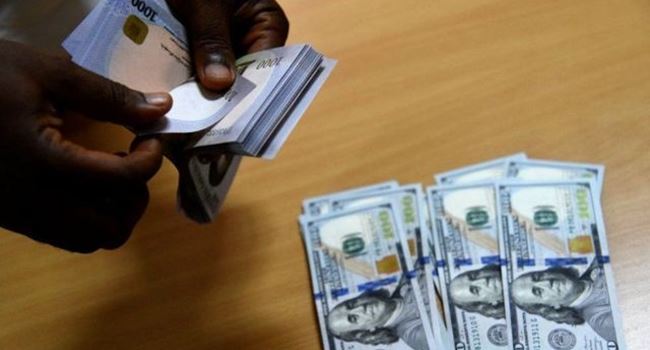The Nigerian naira depreciates against the dollar on Monday, 6th November 2023, closing at N809.02/$1 at the official market.
This represents a 4.06% increase from the N776.14/$1 recorded on Friday 3rd November day.
The intraday high recorded was N1100/$1, while the intraday low was N720.50/$1, representing a wide spread of N379.50/$1.
⇒Join us on Telegram for more Sure and Accurate football-winning tips every day...click here
According to data obtained from the official NAFEM window, forex turnover at the close of the trading was $87.65 million, representing an 11.30% decrease compared to the previous day.
However, on the black market where forex is sold unofficially, the exchange rate appreciated 16.18%, quoted at N1020/$1, while peer-to-peer traders quoted around N1063.50/$1.
Factors Behind the Depreciation:
Several factors have contributed to the devaluation of the Naira:
1. Foreign Exchange Reserves: Nigeria’s foreign exchange reserves have been under pressure due to falling oil prices, which the country heavily relies on for revenue. The decrease in these reserves has made it challenging for the Central Bank to defend the Naira’s value.
2. Inflation: High inflation rates in the country have eroded the purchasing power of the Naira, making it less attractive to investors and foreign exchange traders.
3. Global Economic Uncertainty: Global economic conditions, including geopolitical tensions and the recovery from the COVID-19 pandemic, have affected investor sentiment and capital flows.
4. Central Bank Policies: The Central Bank of Nigeria (CBN) has implemented various policies to manage the exchange rate. However, these measures have faced criticism for their impact on the exchange rate.
Economic Implications:
The depreciation of the Naira has a range of economic implications:
1. Rising Import Costs: A weaker Naira means higher costs for imports, which can lead to increased prices for imported goods and services. This could contribute to domestic inflation and negatively affect consumers’ purchasing power.
2. Investor Confidence: A falling currency can erode investor confidence in the country’s economic stability, potentially leading to reduced foreign investment.
3. Business Operations: Nigerian businesses that rely on imported raw materials and equipment may face increased production costs, potentially affecting profitability.
Government Response:
The Nigerian government and the Central Bank are closely monitoring the situation and are taking measures to address the depreciation of the Naira. These measures include:
1. Foreign Exchange Interventions: The Central Bank has indicated its willingness to intervene in the foreign exchange market to stabilize the Naira.
2. Economic Reforms: The government has committed to implementing economic reforms that will address the structural issues contributing to the depreciation of the Naira.
3. Diversification of Revenue: Efforts to diversify the country’s sources of revenue away from oil are being pursued to reduce Nigeria’s vulnerability to fluctuations in oil prices.
The Association of Bureau de Change Operators of Nigeria has warned those speculating against the naira to be wary.
CBN’s double-edged sword
The President of ABCON, Aminu Gwadabe gave the warning and noted that the Central Bank of Nigeria was set to inflict pain on currency speculators.
- “What is happening in the market and the continuous naira rebounds are the manifestations of the CBN double-edged sword measures of dollar liquidity injection and naira mopping through the instrumentality of interest rates hikes.
- “It is a good development as it is the greatest risk to speculate, hoard, and substitute naira for other currencies,” Gwadabe declared.
The naira had reversed the depreciating trend it had witnessed this year after the CBN started to clear the forex demand backlog in banks.
- “As we continue to observe developments, there is the need for a caution in attacking the naira, as it all appears that the CBN has gotten the arsenal and the logic to continue to enshrine the success recorded,” ABCON added.
- The association noted that there had been “panic selling as against panic buying”.
The BDC operators called on the apex bank to continue to make clarifications and implement some of their recommendations to include them in the foreign exchange market.
Gwadabe said that would enable BDCs to play their roles of meeting the needs of the critical retail end sector, “as they pose highly pass-through effects of the Central Bank foreign exchange rate policy of stability and elimination of disparities in the overall market.
- “The BDCs are necessary for the demand measures of the apex bank transaction monitoring mechanism, and client’s utilisation with correcting and moderating potential,” he said.
Conclusion:
The depreciation of the Naira to N809.02/$1 at the official market is a matter of concern for Nigeria and its citizens. It underscores the importance of addressing underlying economic issues and working toward greater economic stability. The government’s commitment to implementing reforms and the Central Bank’s interventions will be crucial in stabilizing the exchange rate and restoring confidence in the Naira.
As the situation develops, it will be essential for stakeholders, policymakers, and the public to remain informed and vigilant about economic developments in Nigeria.
Disclaimer: This article is based on the information available at the time of writing and may be subject to updates and changes in the future.






